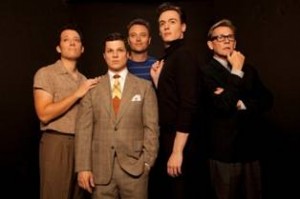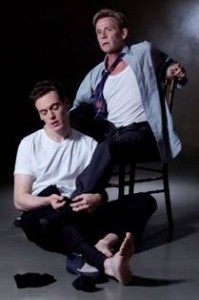
Wikipedia calls the 1969 Stonewall riots “the first instance in American history when people in the homosexual community fought back against a government-sponsored system that persecuted sexual minorities” and “the defining event that marked the start of the gay rights movement in the United States and around the world.”
Sorry Wikipedia, but you’ve got it wrong. The movement for gay rights actually began about two decades earlier right here in Los Angeles, the brainchild of a man named Harry Hay, and Jon Marans’ The Temperamentals sets the record straight (or gay, if you wish).
Marans’ off-Broadway hit, now getting a stupendous West Coast Premiere at the Blank Theatre, introduces us to Harry (Dennis Christopher) and his younger lover Rudi Gernreich (Erich Bergen) in a 1950 Los Angeles few young contemporary gay men probably even realize existed, a Los Angeles in which the mere act of holding another man’s hand in public might provoke a police arrest, an L.A. in which an all-male party might be raided, and one in which no two men in their right minds would ever think of renting a hotel room together, or at least not for an afternoon quickie. This was a Los Angeles where a guilty verdict for “public indecency” meant having one’s name printed in the papers, one’s reputation destroyed, and one’s future decimated. And no wonder. Homosexuals (there was no such thing as a “gay man” in the 1950s) were generally considered either insane, stupid, willfully perverted, unnatural, and/or socially incompetent.
All the more reason to gasp in utter amazement that a 39-year-old British-born, California-raised homosexual was able to come to the very personal realization that he was neither uncommon nor “queer,” but merely “temperamental,” and that he wasn’t going to take his second class sexual minority status lying down.
The Temperamentals follows Harry’s journey in the most stunningly theatrical of ways (no staged movie this one), particularly as brought to life by Michael Matthews’ brilliantly imaginative direction, a truly stellar cast, and a design team working at the peak of their creativity.
Marans’ play moves seamlessly from the Chuckwagon Diner to Rudi’s attic apartment to a Hollywood party to a courtroom to the hills above Silverlake (and plenty of specific and unspecified locales in between), a trio of sensational supporting actors (Patrick Scott Lewis, Mark Shunock, and John Tartaglia) embodying at least half a dozen characters each, if not twice that number.
Over the course of The Temperamentals’ lickety-split two acts, playwright Marans charts Harry’s conversion from closeted married man to the out-and-proud “Radical Faerie” he became, a transformation made visual by Lauren Tyler’s terrific period costumes, which in Harry’s case also include the shawls and bonnets that became his trademark.
Shunock and Tartaglia play longtime companions Chuck Rowland and Bob Hull, with Lewis as Dale Jennings, Bob’s latest paramour, whose arrest for allegedly soliciting a police officer in a public toilet galvanizes the four men’s recently formed Mattachine Society into action.
First though, Marans’ script shows us just how tough it was for the Mattachines to garner any kind of support. Closeted movie director Vincente Minnelli (Shunock), married to Judy Garland at the time, was one of many (the others portrayed by Tartaglia and Lewis in a series of vivid, rapid-fire cameos) who proved too fearful to sign the Mattachine manifesto. Then came Jennings’ arrest, a clear-cut case of police entrapment, and the former carnival worker’s bold decision to fight the charges against him in a court of law—and the temperamentals of the Mattachine Society were on their way.
For The Temperamental’s very first out-of-New York production, Blank Founding Artistic Director Daniel Henning has assembled a team that easily rivals the off-Broadway original in both name-power and talent, onstage and behind the scenes.
Christopher, whose breakout role in 1979’s Breaking Away scored the twenty-four-year-old actor a Golden Globe Award nomination, has that same Midwest boyishness three-plus decades later, a quality which serves him in good stead in his stirring work here as Harry Hay. Bergen, the actor/singer whose voice and charisma turned the National Tour of Jersey Boys into the Bob Gaudio show, proves himself equally thrilling in a (forgive the pun) straight role, investing Rudi with charm, sex appeal, and heart. Tartaglia, the dazzling Tony-nominated star of Broadway’s Avenue Q, also plays it straight/gay here, making for a rich and touching Bob, a forceful defense attorney George Shibley, and a bevy of often hilarious character parts. Shunock, Matthew in 3-D Theatricals’ Altar Boyz, makes a strong impression too in his non-musical roles here (though he does strum a mean ukulele), bringing to life a clearly differentiated Chuck and Vincente. Lewis, the saving grace of a recent production of The Blue Room, does terrific work as Dale, making us believe that this straight-acting former carny guy is indeed a gay rights pioneer. A dream sequence has Christopher’s four costars in early 20th Century female garb for a quirky Act Two-opening dream sequence, one which casts the quartet as various women in Harry’s life, and which Matthews stages with panache—and some carefully-timed spoon-to-tea-cup dings.
Scenic designer Kurt Boetcher’s highly abstract representation of 1950s L.A. is a stunner, and one that envelops the entire theater, making us honorary temperamentals, all the while dazzling us with its versatility. Director Matthews’ highly inventive use of Boetcher’s set extends the action into the center aisle for several particularly powerful moments, none more so than when the men of The Mattachine Society hold hands with audience members in solidarity.
Cameron Zetty lights Boetcher’s set with great imagination, and Warren Davis scores points again and again for his striking sound design as does Matt Wolpe for his work as music director. Michael O’Hara gets kudos for his period props, too.
Mercedes Clanton is stage manager, Jim Halloran assistant director, and Sarah A. Bauer assistant stage manager. The Temperamentals is produced by Matthew Graber, Henning, Angel Parker, and Noah Wyle. Jesse Einstein, Nathan Frizzell, Daniel C. Garcia, Michael Geniac, Halloran, David Hemphill, and AJ Jones are associate producers. Casting is by Scott David and Erica Silverman.
The Temperamentals is that rarity, a play that works both as history lesson and as a piece of theatrical magic. For young LGBT Angelinos, its glimpse at our gay past ought to be required viewing. As for regular L.A. theater aficionados, one thing is certain. They will be lining up in droves. Order your tickets now, or be prepared to be placed on a mile-long waiting list to get Temperamental.
The Blank 2nd Stage Theatre, 6500 Santa Monica Boulevard, Hollywood.
www.TheBlank.com
–Steven Stanley
April 15, 2011
Photos: Greg Gorman




 Since 2007, Steven Stanley's StageSceneLA.com has spotlighted the best in Southern California theater via reviews, interviews, and its annual StageSceneLA Scenies.
Since 2007, Steven Stanley's StageSceneLA.com has spotlighted the best in Southern California theater via reviews, interviews, and its annual StageSceneLA Scenies.







 COPYRIGHT 2024 STEVEN STANLEY :: DESIGN BY
COPYRIGHT 2024 STEVEN STANLEY :: DESIGN BY